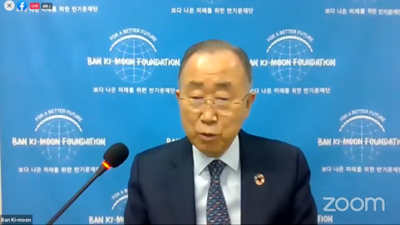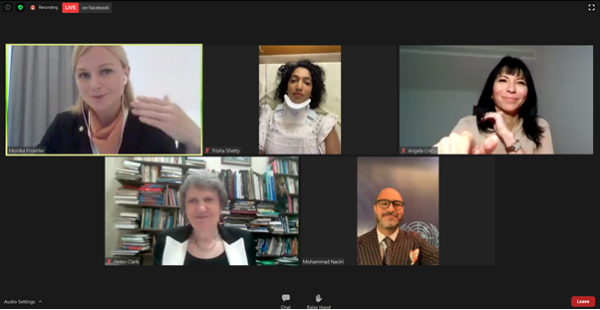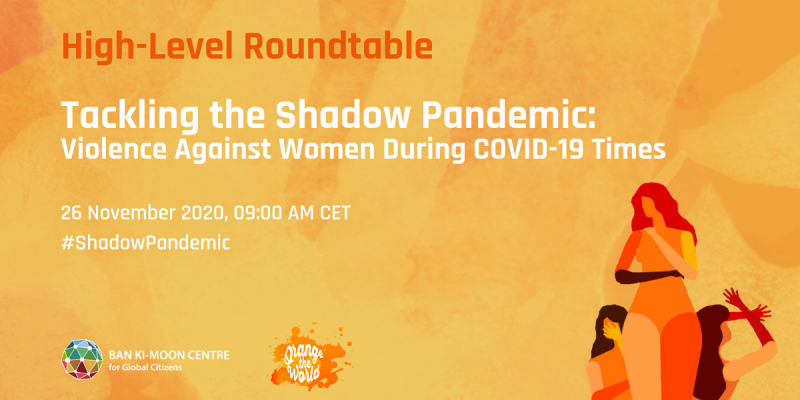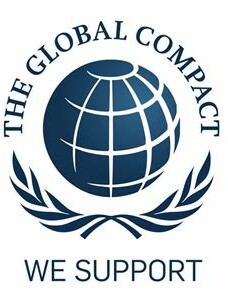Before the outbreak of the COVID-19 pandemic, data estimated that 1 in 3 women will experience violence in their lifetime. As countries went into lockdown, reports on domestic violence have spiked.
Kicking off the 16 Days of Activism against Gender-Based Violence and as part of the global Orange the World Campaign, the BKMC hosted a virtual High-Level Roundtable titled “Tackling the Shadow Pandemic – Violence against Women During COVID-19 Times” on 26 November 2020. The multi-stakeholder event aimed to highlight the dramatic impact of COVID-19 on violence against women and girls (VAWG).
Ban Ki-moon and Heinz Fischer, Co-chairs of the BKMC, opened the BKMC’s Orange the World event showing their support in emphasizing that VAWG violates our common values as humanity.

“VAWG does not only affect victims, it impacts the entire society through multiple generations. We must engage in an open dialogue and bring all stakeholders to the table. Every field, every sector must be involved.” – Ban Ki-moon
Heinz Fischer highlighted the life-threatening aspect of VAWG and underlined that women’s rights are also human rights: “Only solidarity, empathy, and the will for action can turn this shadow pandemic around and give women and girls the rights and dignity they deserve.”
In a special message, Phumzile Mlambo-Ngcuka, United Nations Under-Secretary-General and UN Women Executive Director called for “all hands on deck” to address the silence around VAWG and the discrimination against survivors: “We must engage as allies in this situation, and that includes men and boys.”
The highlight of the OTW event was the high-level roundtable discussing how to tackle the Shadow Pandemic with the outstanding panelists Helen Clark, Former Prime Minister of New Zealand, Angela Cretu, CEO of Avon, Mohammad Naciri, Regional Director of UN Women Asia and Pacific & Trisha Shetty, women’s rights activist and founder of SheSays.

Helen Clark highlighted the need to have more women in leadership to formulate gender-responsive responses against VAWG, arguing that “More attention is paid to issues that address women when women are there to do something about it”.
Along with raising awareness for domestic violence, Angela Cretu stressed that the private sector provides the necessary economic measures to empower women: “Only 10% of women report abusers to officials in fear of losing their children or livelihood. Businesses, together with governments need to create opportunities for women to gain financial freedom.”
With a unique perspective from the Asia & Pacific Region, Mohammad Naciri underscored that victims are not only trapped at home with their abusers, but digitalization has enabled the rise of online harassment and online misogyny: “We need to expand the legislation that criminalizes harassment as stalking. This does not exist in some countries.”
Considering the dramatic increase of domestic violence cases, Trisha Shetty especially advocated taking action by investing in support services for survivors and advocating for leadership that celebrates women’s dignity and proactively acts against VAWG.
Trisha emphasized,“…we are leaving far too many behind. It is costing us progress to our society and economy.” Ending violence concerns everyone!
Watch the whole event:
Special Message from Phumzile Mlambo-Ngcuka:
To learn more about orange the world click here.

